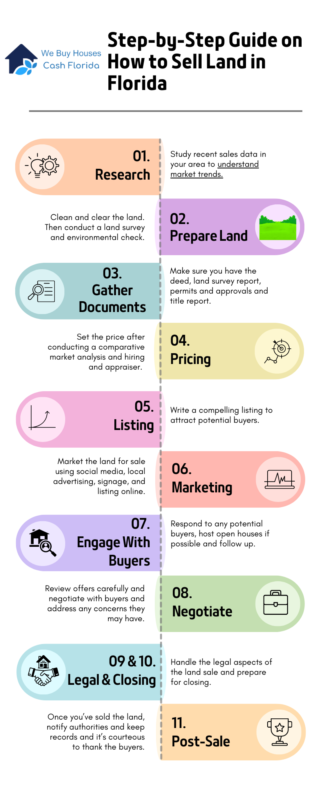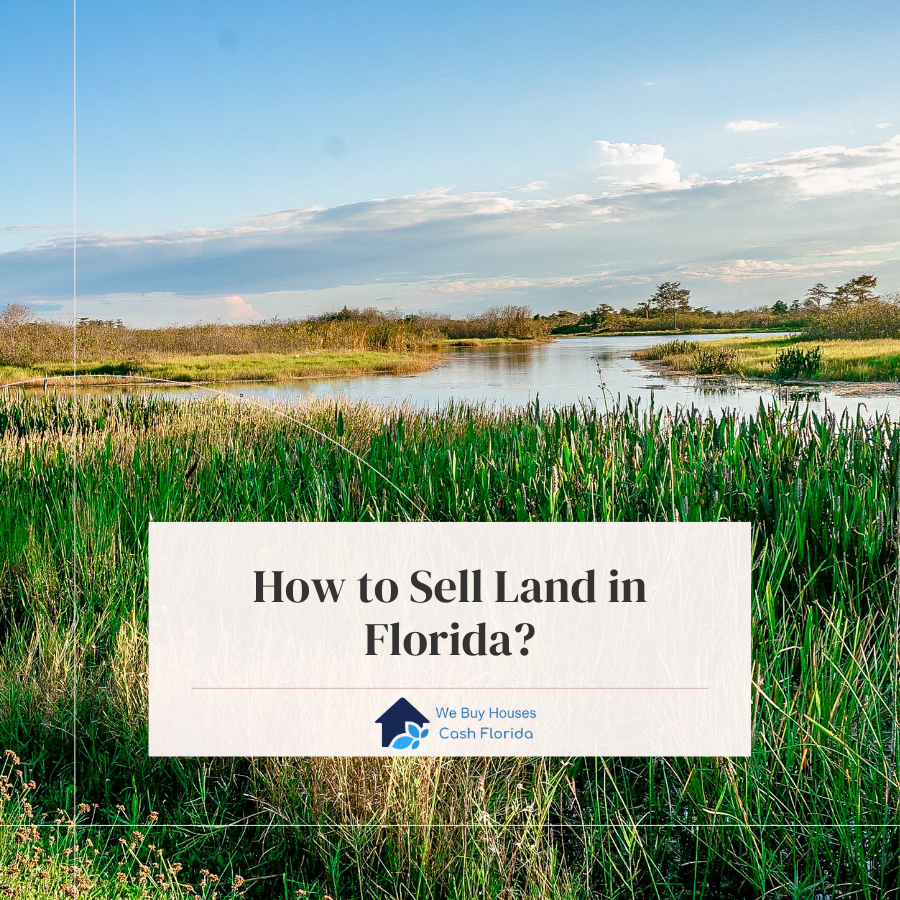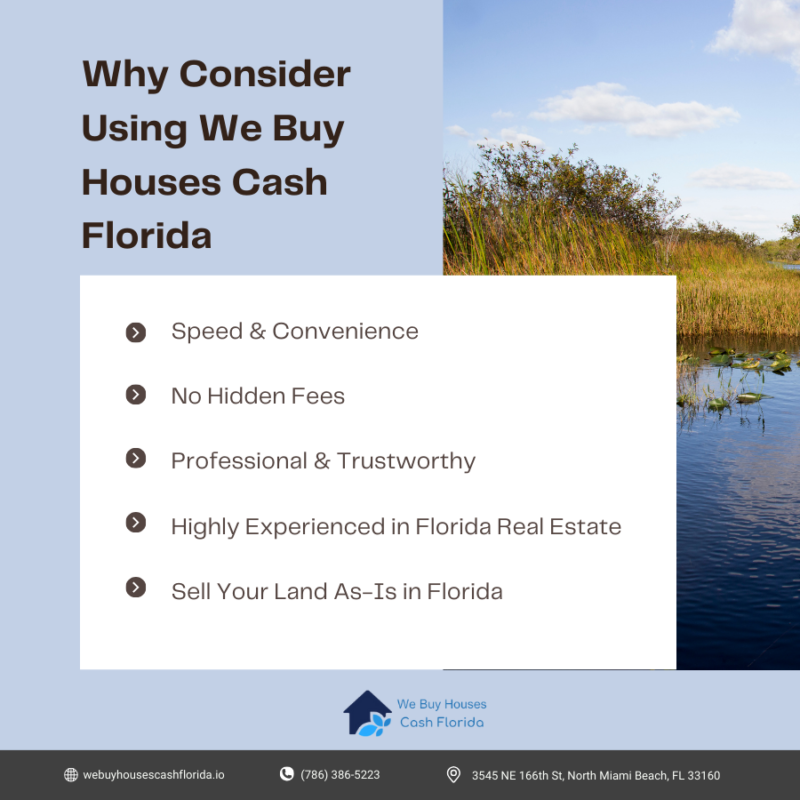Selling land in Florida by owner, without a real estate agent or lawyer, is easier than ever. If you bought a piece of land in Florida and are sitting on it, but don’t know what to do with it—you’ll want to keep reading. Below, we’ll detail exactly how to sell your land in Florida, key insights on the Florida land market, and everything else you need to know about offloading your land.
Understanding the Florida Land Market
One of the most critical aspects of selling land is knowing your market. So that’s why I provided you with a detailed look at the average sale prices per acre of land in Florida over the past few years.
| Quarter | Average Sale Price (per acre) |
| Q2 2021 | $3,092 |
| Q3 2021 | $6,022 |
| Q4 2021 | $8,072 |
| Q1 2022 | $6,257 |
| Q2 2022 | $11,641 |
| Q3 2022 | $6,689 |
| Q4 2022 | $6,816 |
| Q1 2023 | $4,967 |
| Q2 2023 | $10,647 |
| Q3 2023 | $8,845 |
| Q4 2023 | $10,688 |
| Q1 2024 | $8,569 |
Notice how things started to pick up after Q1 2023, and there was an increase in demand. This indicates a shift in the market dynamics, and this trend may continue, with interest rates expected to drop in the near future.
Of course, there are other factors that influence land prices. For example, location is a big factor. In cities like Miami and Orlando—the price per acre of land could be north of $25,000.
Here are the factors you’ll want to be wary of:
- Proximity to Urban Areas, Highways, and Amenities: The value of land can be significantly boosted by its closeness to urban centers, major highways, and essential amenities.
- Accessibility: The ease of access to the property, including road conditions and transportation links, can enhance its appeal.
- Zoning Regulations: Local zoning laws influence the potential uses of the land, affecting its attractiveness and value.
- Development Potential: Land suitable for residential, commercial, or agricultural development generally commands higher prices.
Step-by-Step Guide on How to Sell Land in Florida

Now, if you bought land in Florida a few years ago—you may be sitting on some potential profits. You’ll still need to go through the process of selling the land, so here’s a step-by-step guide to walk you through the process.
Step 1: Research and Understand the Market
- Analyze Market Trends: Study recent sales data in your area to understand market trends. Look at average prices, the number of sales, and time on the market.
- Identify Key Factors: Consider factors that influence land prices, such as location, accessibility, zoning laws, and development potential.
Step 2: Prepare Your Land
- Clean and Clear the Land: Remove any debris, mow the grass, and trim overgrown vegetation. Ensure the property is presentable.
- Conduct a Land Survey: Hire a professional surveyor to define property boundaries accurately. This helps avoid disputes and clarifies what is being sold.
- Environmental Check: Identify any environmental issues, such as wetlands or protected wildlife habitats, and address them if necessary.
Step 3: Gather Necessary Documents
- Deed: Ensure you have the original deed, which proves ownership of the land.
- Land Survey Report: Obtain a current survey report showing the property boundaries and any easements.
- Permits and Approvals: Gather all relevant permits, such as building permits or environmental clearances.
- Title Report: Secure a title report to confirm that the land is free of liens or encumbrances.
Step 4: Set the Right Price
- Conduct a Comparative Market Analysis (CMA): Look at similar properties in your area to determine a competitive price.
- Hire an Appraiser: For a detailed valuation, consider hiring a professional appraiser.
- Use Online Tools: Utilize platforms like Zillow and LandWatch to get a sense of market pricing.
Step 5: Create a Compelling Listing
- Write a Detailed Description: Highlight the size, location, topography, zoning, and any unique features of the land.
- Take High-Quality Photos: Invest in professional photography, including aerial shots if possible, to showcase the property.
- Virtual Tour: Create a virtual tour or video walkthrough to give potential buyers a realistic view of the land.
Step 6: Market the Property
- List Online: Use popular real estate sites such as Zillow, Realtor.com, and specialized land sale sites like LandWatch.
- Utilize Social Media: Promote your listing on social media platforms like Facebook, Instagram, and LinkedIn.
- Local Advertising: Place ads in local newspapers, real estate magazines, and community bulletin boards.
- Signage: Place a “For Sale” sign on the property with contact information and a link to the online listing.
Step 7: Engage with Potential Buyers
- Respond Promptly: Be responsive to inquiries and provide additional information as needed.
- Host Open Houses: Schedule open house events to allow potential buyers to view the property in person.
- Follow Up: Keep track of interested parties and follow up to answer any further questions or arrange additional viewings.
Step 8: Negotiate Offers
- Review Offers: Carefully review all offers, considering both the price and terms.
- Negotiate: Be prepared to negotiate with buyers. Know your bottom line and be clear about your terms.
- Address Concerns: Be ready to address any concerns the buyer might have about the property, such as environmental or legal issues.
Step 9: Handle Legal Aspects
- Draft the Sales Agreement: Use a standard land sale contract, including essential terms like purchase price, closing date, and contingencies.
- Legal Review: Have a real estate attorney review the contract to ensure compliance with Florida laws.
- Escrow Service: Use an escrow service to handle funds and documents during the transaction.
Step 10: Close the Sale
- Prepare for Closing: Gather all necessary documents, including the deed, survey report, permits, and the sales agreement.
- Closing Meeting: Attend the closing meeting where all parties will sign the final paperwork. The buyer will transfer funds to the escrow account.
- Transfer Deed: Sign the deed over to the buyer and ensure it is properly recorded with the county.
Step 11: Post-Sale Follow-Up
- Notify Authorities: Inform local authorities about the sale to update property tax records.
- Keep Records: Maintain a file of all documents related to the sale for future reference.
- Thank Buyers: Send a thank-you note to the buyers, fostering a positive relationship.
How to Prepare Land in Florida for Sale
Cleaning and Clearing
First impressions matter. Ensure your land is presentable by removing debris, mowing grass, and trimming overgrown vegetation. A clean and well-maintained property is more appealing and can justify a higher asking price.
Land Survey
A professional land survey provides accurate boundaries and identifies potential uses. Buyers are more likely to invest in a property with clearly defined boundaries and documented legal descriptions. A survey can also highlight any easements or encroachments, helping you address these issues proactively.
Environmental Considerations
Check for any environmental issues that could affect the sale. This includes wetlands, protected wildlife habitats, and contamination. Understanding these factors can help you manage buyer expectations and avoid surprises during negotiations.
Legal Requirements
Gather all necessary documents, including the deed, previous surveys, permits, and any other relevant paperwork. Having these documents readily available can expedite the sales process and build buyer confidence.
Setting the Right Price
Determining the market value of your land is essential for attracting buyers and negotiating effectively. Pricing your property too high can deter potential buyers, while pricing it too low may result in a loss of value.
Comparative Market Analysis (CMA)
Conduct a Comparative Market Analysis (CMA) to evaluate the prices of similar properties in your area. Look at recent sales data, current listings, and properties that have been withdrawn from the market. This analysis can provide a realistic price range for your land.
Professional Appraisers
Consider hiring a professional appraiser for a detailed valuation. Appraisers take into account various factors, including location, size, topography, and current market conditions. Their expertise can provide a more accurate and unbiased valuation, which can be particularly useful during negotiations.
Online Tools
Utilize online tools like Zillow, LandWatch, and Realtor.com to gather initial pricing data. These platforms offer listings, market trends, and valuation estimates that can help you set a competitive price. However, remember that online estimates can vary, and it’s advisable to corroborate this data with professional advice.
Marketing Land for Sale
If you don’t know already, if you’re looking to sell land in Florida on your own—it’s important to get your marketing chops up. You see, effective marketing helps you reach potential buyers and secure a good price for your Florida land.
Creating a Compelling Listing
Creating a compelling listing is the first step in attracting potential buyers. Here’s how to make your listing stand out:
- Detailed Descriptions: Provide a thorough description of your property, including its size, location, topography, and any unique features. Mention any improvements or developments made on the land.
- High-Quality Photos: Invest in professional photography to capture the best aspects of your land. Include images of the entire property, highlighting key areas such as natural features, access points, and any structures.
- Aerial Shots: Use drone photography to provide potential buyers with a comprehensive view of the property and its surroundings.
- Virtual Tours: Consider creating a virtual tour or video walkthrough to give buyers a realistic sense of the land.
Utilizing Effective Platforms
Utilizing the right platforms to list your land can maximize exposure and attract serious buyers. Here are some effective platforms:
- Online Real Estate Sites: List your property on popular sites like Zillow, Realtor.com, and Redfin. These platforms attract a large audience of potential buyers.
- Specialized Land Sale Sites: Use niche websites such as LandWatch, Land and Farm, and Acreage.com, which cater specifically to buyers interested in land.
- MLS (Multiple Listing Service): If you’re working with a real estate agent, ensure your property is listed on the MLS, which reaches a network of real estate professionals and their clients.
- Social Media: Leverage social media platforms like Facebook, Instagram, and LinkedIn to promote your listing. Use targeted ads to reach potential buyers in specific locations or demographics.
Effective Advertising
In addition to online listings, consider traditional advertising methods to reach a broader audience:
- Local Newspapers: Place ads in local newspapers and community bulletins to attract buyers within the region.
- Real Estate Magazines: Advertise in real estate magazines and journals that focus on land and property investments.
- Signage: Place a “For Sale” sign on the property itself, with contact information and a website link for more details.
- Open Houses: Host open house events to allow potential buyers to visit the property and ask questions.
Negotiating with Buyers
Successful negotiations require understanding the buyer’s perspective, being prepared to compromise, and maintaining a professional demeanor throughout the process.
Tips for Negotiation
- Clear Bottom Line: Know your minimum acceptable price and stick to it. This helps prevent accepting offers that are too low.
- Stay Calm: Keep a calm and professional attitude during negotiations. Emotional reactions can hinder the process.
- Answer Questions: Be ready to answer any questions the buyer might have about the property, including its history, zoning, and potential uses.
Understanding Concerns
- Environmental Issues: Be transparent about any environmental concerns, such as wetlands, flood zones, or contamination.
- Legal and Access Issues: Address any legal issues, such as easements or encroachments, and ensure buyers are aware of access points and road conditions.
- Utility Availability: Provide information on the availability of utilities such as water, electricity, and sewage systems.
Closing the Deal
- Written Agreements: Ensure all agreements and offers are documented in writing. Verbal agreements can lead to misunderstandings and disputes.
- Consult a Lawyer: Consider hiring a real estate attorney to review contracts and closing documents. They can help ensure the transaction complies with state laws and protect your interests.
The Legal Aspects of Selling Land in Florida
When you’re selling land in Florida, it’s of the utmost importance to understand the legal landscape to make sure the transaction goes smoothly. That means understanding state regulations, gathering necessary documentation, and handling contracts.
Florida Land Sale Laws
Familiarize yourself with Florida’s land sale laws to ensure compliance and avoid legal issues. Here are some essential aspects to consider:
- Disclosure Requirements: Florida law requires sellers to disclose any known material facts affecting the value of the property. This includes environmental hazards, zoning restrictions, and any other issues that could impact the land’s use or value.
- Environmental Regulations: Be aware of any state or federal environmental regulations that apply to your property. This may include wetland protection, endangered species habitats, and contamination cleanup requirements.
- Zoning Laws: Verify the zoning classification of your land and any potential changes or restrictions. Zoning laws can affect the types of developments allowed on the property.
Important Documents
Having all necessary documents ready is essential for a smooth sale. Key documents include:
- Deed: The deed proves ownership of the land and must be transferred to the buyer upon sale. Ensure it is up-to-date and accurately reflects your ownership.
- Land Survey: A current land survey delineates the property boundaries and identifies any easements or encroachments. This is crucial for resolving boundary disputes and ensuring the buyer knows exactly what they are purchasing.
- Permits and Approvals: Gather any relevant permits, such as building permits, environmental permits, and zoning approvals. These documents demonstrate compliance with local regulations and can be a selling point.
- Title Report: A title report confirms that the title is clear of liens or encumbrances. Obtaining title insurance can protect both the buyer and seller from future claims against the property.
Handling Contracts
Using a well-drafted contract is critical to protect your interests and outline the terms of the sale. Consider the following:
- Standard Land Sale Contract: Utilize a standard land sale contract that includes essential terms such as the purchase price, closing date, contingencies, and any seller disclosures. Templates are available online, but customization may be necessary to fit your specific situation.
- Legal Review: Consider hiring a real estate attorney to review the contract and other legal documents. An attorney can ensure compliance with state laws, identify potential issues, and provide legal advice throughout the process.
- Escrow and Closing: Use an escrow service to hold funds and documents during the transaction. The escrow agent ensures that both parties meet their obligations before the sale is finalized. At closing, all documents are signed, and the deed is transferred to the buyer.
If this process looks too lengthy for your liking, there is one alternative—consider companies that buy land.
Consider Selling Your Land in Florida for Cash
Selling land in Florida can be a time-consuming and complex process. From preparing the property to finding the right buyer and navigating legal hurdles, it often takes months or even longer to finalize a sale. However, We Buy Houses Cash Florida offers an efficient and hassle-free alternative for landowners looking to sell quickly and with minimal effort. Here’s how they can speed up the sales process and why you should consider using their services.
How We Buy Houses Cash Florida Buys Land
Contact and Initial Consultation
- Easy Contact: Landowners can easily reach out to We Buy Houses Cash Florida via their website or phone.
- Initial Consultation: During the initial consultation, you provide basic information about your land, such as location, size, and any unique features. This helps them understand your property and your selling needs.
Property Evaluation
- Quick Assessment: The team at We Buy Houses Cash Florida conducts a quick but thorough evaluation of your land. They consider factors such as market value, location, accessibility, and potential for development.
- No Obligations: This evaluation is free of charge and comes with no obligations. You are under no pressure to proceed unless you are fully satisfied with their offer.
Receive a Cash Offer
- Fair Market Offer: Based on their assessment, We Buy Houses Cash Florida presents you with a competitive cash offer. This offer is designed to reflect the current market value and condition of your land.
- Transparent Process: They provide a clear and transparent explanation of how they arrived at the offer amount, ensuring you understand every aspect of the deal.
Accept the Offer and Close the Deal
- Fast Acceptance: If you accept the offer, the closing process begins immediately. There is no waiting for bank approvals or lengthy negotiations with buyers.
- Streamlined Closing: We Buy Houses Cash Florida handles all the necessary paperwork and legalities, making the closing process smooth and straightforward.
- Quick Payment: Once the paperwork is completed, you receive your payment in cash, often within a matter of days.
How We Buy Houses Cash Florida Speeds Up Sales
- No Listing Needed: Traditional sales involve listing your land on various platforms, which can take months to attract serious buyers. We Buy Houses Cash Florida eliminates this step by purchasing directly from you.
- Avoiding Market Uncertainties: The real estate market can be unpredictable, with prices fluctuating and deals falling through. We Buy Houses Cash Florida provides a guaranteed sale, shielding you from market volatility.
- Simplified Process: They handle all aspects of the sale, from evaluation to closing, saving you the hassle of managing multiple steps and dealing with various parties.
- No Repairs Required: Unlike traditional buyers who may request repairs or improvements, We Buy Houses Cash Florida buys your land “as-is,” saving you time and money.
Why Consider Using We Buy Houses Cash Florida
- Speed and Convenience: If you need to sell your land quickly due to financial reasons, relocation, or other personal circumstances, We Buy Houses Cash Florida offers a fast and efficient solution.
- Guaranteed Sale: Once you accept their offer, the sale is guaranteed. This certainty can provide peace of mind, especially in uncertain market conditions.
- No Hidden Fees: Traditional sales often come with hidden costs such as agent commissions, closing fees, and marketing expenses. With We Buy Houses Cash Florida, you receive the full offer amount without any deductions.
- Professional and Trustworthy: We Buy Houses Cash Florida has a reputation for professionalism and trustworthiness. Their transparent process and commitment to fair dealings ensure a positive selling experience.
Final Thoughts on How to Sell Land in Florida
Selling your land in Florida doesn’t have to be a long, drawn-out process. By choosing We Buy Houses Cash Florida, you can benefit from a quick, hassle-free sale with a guaranteed cash offer. Their streamlined approach and commitment to customer satisfaction make them an excellent choice for landowners looking to sell efficiently and confidently. Contact We Buy Houses Cash Florida today to learn more about how they can help you achieve your selling goals.
FAQs
How to Sell Land by Owner in Florida
Selling land on your own (For Sale By Owner – FSBO) can be rewarding if done correctly. Follow these steps to maximize your chances of a successful sale:
Step-by-Step Guide
- Clean the Land: Make the property presentable by removing debris, mowing grass, and trimming vegetation. A well-maintained property attracts more buyers.
- Set a Price: Determine a competitive price based on a Comparative Market Analysis (CMA) and professional appraisal. Consider market conditions and the unique features of your land.
- Create a Listing: Write a compelling listing with detailed descriptions, high-quality photos, and, if possible, aerial shots. Highlight the property’s features and potential uses.
- Market the Property: Use online platforms such as Zillow, Realtor.com, and LandWatch. Advertise in local newspapers, real estate magazines, and on social media. Hosting open houses can also attract potential buyers.
- Negotiate with Buyers: Be prepared to negotiate the price and terms of the sale. Understand the buyer’s concerns and be ready to address them. Maintain a professional demeanor and aim for a win-win agreement.
- Close the Sale: Once you reach an agreement, prepare the necessary documents for closing. Use an escrow service to manage funds and documents. At closing, sign the final paperwork and transfer the deed to the buyer.
What is the Best Way to Sell Vacant Land in Florida?
The best way to sell vacant land in Florida depends on your specific needs and circumstances. Here are some common approaches:
Real Estate Agent
- Pros: Real estate agents have market knowledge, negotiation skills, and access to the Multiple Listing Service (MLS), which can expose your property to a wide audience.
- Cons: Agents charge a commission, usually around 5-6% of the sale price, which can reduce your net proceeds.
For Sale By Owner (FSBO)
- Pros: You avoid paying agent commissions and have full control over the sales process.
- Cons: Selling land on your own requires significant time and effort, including marketing, negotiating, and handling legal paperwork.
Cash Buyers (e.g., We Buy Houses Cash Florida)
- Pros: Cash buyers offer a fast and hassle-free sale process. You can sell your land “as-is” without making any improvements, and you receive a cash payment quickly.
- Cons: The cash offer may be slightly lower than what you could potentially get on the open market, but the speed and convenience can be worth it.
How Much is an Acre of Land Selling for in Florida?
The price of an acre of land in Florida varies significantly based on several factors:
- Location: Land in urban areas or near popular destinations tends to be more expensive. For example, land in Miami or Orlando can be significantly higher priced than in rural areas.
- Use: Land designated for commercial, residential, or agricultural use will have different values.
- Market Conditions: Real estate market conditions fluctuate, impacting land prices. For the most accurate and current data, consult local real estate listings, recent sales reports, or a professional appraiser.
As of the latest data (Q1 2024), here are some average prices:
- Urban Areas: Prices can range from $20,000 to $100,000+ per acre.
- Suburban Areas: Prices typically range from $10,000 to $50,000 per acre.
- Rural Areas: Prices can range from $5,000 to $20,000 per acre.
For specific and up-to-date information, you should check local listings and consult with real estate professionals.
What is the Fastest Way to Sell Land in Florida?
The fastest way to sell land in Florida is to work with a cash buyer, such as We Buy Houses Cash Florida. Here’s why:
- Quick Evaluation and Offer: Cash buyers can evaluate your property and make a cash offer within days.
- No Repairs Needed: You can sell the land “as-is” without spending time and money on improvements.
- Streamlined Process: Cash buyers handle all paperwork and legal requirements, significantly speeding up the closing process.
- Immediate Payment: Once you accept the offer, you can receive payment in as little as a week.
Selling to a cash buyer is particularly beneficial if you need to liquidate your asset quickly due to financial reasons, relocation, or other urgent circumstances.




